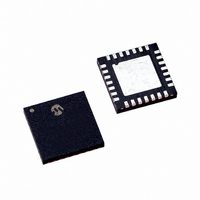PIC24FJ16GA002-E/ML Microchip Technology, PIC24FJ16GA002-E/ML Datasheet - Page 34

PIC24FJ16GA002-E/ML
Manufacturer Part Number
PIC24FJ16GA002-E/ML
Description
IC PIC MCU FLASH 16K 28-QFN
Manufacturer
Microchip Technology
Series
PIC® 24Fr
Datasheets
1.PIC24FJ16GA002-ISS.pdf
(52 pages)
2.PIC24FJ16GA002-ISS.pdf
(268 pages)
3.PIC24FJ16GA002-ISS.pdf
(22 pages)
4.PIC24FJ64GA004-EPT.pdf
(262 pages)
Specifications of PIC24FJ16GA002-E/ML
Program Memory Type
FLASH
Program Memory Size
16KB (5.5K x 24)
Package / Case
28-VQFN Exposed Pad, 28-HVQFN, 28-SQFN, 28-DHVQFN
Core Processor
PIC
Core Size
16-Bit
Speed
32MHz
Connectivity
I²C, PMP, SPI, UART/USART
Peripherals
Brown-out Detect/Reset, LVD, POR, PWM, WDT
Number Of I /o
21
Ram Size
4K x 8
Voltage - Supply (vcc/vdd)
2 V ~ 3.6 V
Data Converters
A/D 10x10b
Oscillator Type
Internal
Operating Temperature
-40°C ~ 125°C
Processor Series
PIC24FJ
Core
PIC
Data Bus Width
16 bit
Data Ram Size
4 KB
Interface Type
I2C, IrDA, SPI, UART
Maximum Clock Frequency
32 MHz
Number Of Programmable I/os
21
Number Of Timers
5
Maximum Operating Temperature
+ 125 C
Mounting Style
SMD/SMT
3rd Party Development Tools
52713-733, 52714-737, 53276-922, EWDSPIC
Development Tools By Supplier
PG164130, DV164035, DV244005, DV164005, PG164120, DM240011, MA240013, AC164127, DM300027, DV164033, DM240002
Minimum Operating Temperature
- 40 C
On-chip Adc
10 bit, 10 Channel
Lead Free Status / RoHS Status
Lead free / RoHS Compliant
For Use With
DM240011 - KIT STARTER MPLAB FOR PIC24F MCUAC162088 - HEADER MPLAB ICD2 24FJ64GA004 28AC164336 - MODULE SOCKET FOR PM3 28/44QFNDV164033 - KIT START EXPLORER 16 MPLAB ICD2
Eeprom Size
-
Lead Free Status / Rohs Status
Lead free / RoHS Compliant
Available stocks
Company
Part Number
Manufacturer
Quantity
Price
Company:
Part Number:
PIC24FJ16GA002-E/ML
Manufacturer:
Microchip Technology
Quantity:
135
Part Number:
PIC24FJ16GA002-E/ML
Manufacturer:
MICROCHIP/微芯
Quantity:
20 000
PIC24FJXXXGA0XX
5.0
5.1
The programmer and programming executive have a
master-slave relationship, where the programmer is
the master programming device and the programming
executive is the slave.
All communication is initiated by the programmer in the
form of a command. Only one command at a time can
be sent to the programming executive. In turn, the
programming executive only sends one response to
the programmer after receiving and processing a
command. The programming executive command set
is described in Section 5.2 “Programming Executive
Commands”. The response set is described in
Section 5.3 “Programming Executive Responses”.
5.1.1
The Enhanced ICSP interface is a 2-wire SPI,
implemented using the PGCx and PGDx pins. The
PGCx pin is used as a clock input pin and the clock
source must be provided by the programmer. The
PGDx pin is used for sending command data to, and
receiving response data from, the programming
executive.
Data transmits to the device must change on the rising
edge and hold on the falling edge. Data receives from
the device must change on the falling edge and hold on
the rising edge.
All data transmissions are sent to the Most Significant
bit (MSb) first, using 16-bit mode (see Figure 5-1).
FIGURE 5-1:
DS39768D-page 34
PGCx
PGDx
MSb
1
P1B
THE PROGRAMMING
EXECUTIVE
Programming Executive
Communication
P1A
14 13 12 11
COMMUNICATION INTERFACE
AND PROTOCOL
2
3
P1
4
PROGRAMMING
EXECUTIVE SERIAL
TIMING FOR DATA
RECEIVED FROM DEVICE
5
...
6
5
11
4
P2
12
3
13
2
14
P3
1
15 16
LSb
FIGURE 5-2:
Since a 2-wire SPI is used, and data transmissions are
half duplex, a simple protocol is used to control the
direction of PGDx. When the programmer completes a
command transmission, it releases the PGDx line and
allows the programming executive to drive this line
high. The programming executive keeps the PGDx line
high to indicate that it is processing the command.
After the programming executive has processed the
command, it brings PGDx low for 15 μsec to indicate to
the programmer that the response is available to be
clocked out. The programmer can begin to clock out the
response 23 μsec after PGDx is brought low, and it must
provide the necessary amount of clock pulses to receive
the entire response from the programming executive.
After the entire response is clocked out, the program-
mer should terminate the clock on PGCx until it is time
to send another command to the programming
executive. This protocol is shown in Figure 5-3.
5.1.2
In Enhanced ICSP mode, the PIC24FJXXXGA0XX
family devices operate from the internal Fast RC oscil-
lator (FRCDIV), which has a nominal frequency of
8 MHz. This oscillator frequency yields an effective
system clock frequency of 4 MHz. To ensure that the
programmer does not clock too fast, it is recommended
that a 4 MHz clock be provided by the programmer.
5.1.3
The programming executive uses no Watchdog Timer
or time-out for transmitting responses to the program-
mer. If the programmer does not follow the flow control
mechanism using PGCx, as described in Section 5.1.1
“Communication Interface and Protocol”, it is
possible that the programming executive will behave
unexpectedly while trying to send a response to the
programmer. Since the programming executive has no
time-out, it is imperative that the programmer correctly
follow the described communication protocol.
As a safety measure, the programmer should use the
command time-outs identified in Table 5-1. If the
command time-out expires, the programmer should
reset
programming the device again.
PGCx
PGDx
MSb
the
1
P1B
P1A
SPI RATE
TIME-OUTS
2
14 13 12 11
programming
3
P1
4
PROGRAMMING
EXECUTIVE SERIAL TIMING
FOR DATA TRANSMITTED
TO DEVICE
5
© 2008 Microchip Technology Inc.
6
...
11
executive
5
P2
12
4
13
3
14
2
P3
and
15 16
1
LSb
start













